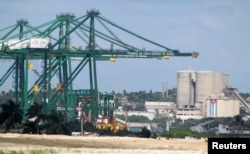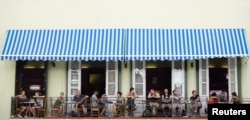American tourists strolling the ample squares and narrow streets of colonial Havana may not know it, but from novelist Ernest Hemingway's famed Floridita bar to Sloppy Joe's eatery, they are probably patronizing businesses owned by Cuba's military.
It is that lucrative line of business that President Donald Trump will target when he rolls out his new Cuba policy Friday in Miami, the heart of the country's hard-line exile community, according to U.S. officials who have seen a draft presidential memorandum.
Trump will significantly restrict U.S. companies from doing business with some military-linked enterprises, the officials said.
"Any ban on using military-owned tourism facilities would make it very difficult to bring groups larger than seven people, because for logistical reasons you need to work with the government," said Collin Laverty, president of Cuba Educational Travel.
The number of Americans traveling to Cuba, mostly in large groups because of U.S. regulations, has nearly tripled in recent years and was expected to reach around 400,000 in 2017, according to U.S. travel agencies.
Trump's expected limits on U.S. business deals will target the Armed Forces Business Enterprises Group (GAESA), a conglomerate involved in all sectors of the economy that is led by General Luis Alberto Rodriguez, reportedly President Raul Castro's son-in-law.
That is bad news for the pro-engagement U.S. politicians and hundreds of businesses that flocked to Cuba in the last few years in search of new opportunities.
Lone hotel deal
The only hotel deal struck to date may prove the last for now, at least in the capital. Starwood Hotels & Resorts Worldwide, which is owned by Marriott International, signed on to manage a Gaviota hotel in Havana under the Sheraton brand, which opened in 2016.
Gaviota is part of GAESA, and tourism development projects in Havana and other choice locations are almost exclusively in its hands.
U.S. Gulf Coast ports and the Port of Virginia, which have signed letters of intent to work with the new Mariel container terminal, will most likely have to look elsewhere for shipping partners because it is controlled by Almacenes Universales, another GAESA company.
The terminal feeds a surrounding Chinese-style development zone that allows investors 100 percent ownership and that was visited by dozens of U.S. business delegations beginning in 2015, though no deals were signed. It also is controlled by Almacenes Universales.
GAESA does not run Cuba's airports, or its cruise ship terminals, meaning U.S. airlines and cruise operators might not be directly affected, but it does control the marinas.
All the state hotels, stores and eateries in colonial Old Havana are owned by Habaguanex, which was recently taken over from the city historian's office by GAESA.
GAESA began modestly enough in the 1980s as an effort to bring modern management to the civilian sector mired in the ways of Soviet-style administration.
It has grown dramatically over the last decade since Raul Castro took over for his ailing and now deceased older brother, Fidel.
Today GAESA boasts dozens of companies that control 40 percent to 60 percent of the Caribbean island's foreign exchange earnings, according to Cuban economists.
GAESA's books, like those of other state-run companies, are not public.
Military's self-interest
Some Cuba experts and diplomats believe the military is feathering its own nest and perhaps preparing to cash in if the government falls.
But others believe revenues flow to the cash-strapped state.
A former British ambassador to Cuba, Paul Hare, who lectures at Boston University's Pardee School of Global Studies, said the military was viewed as a guardian of the Revolution.
"Their function is to ensure that private Cubans and foreign investors do not undermine the principles of 'socialism,' " he said.
The holding company controls virtually all of the thousands of stores, supermarkets and malls in the country that sell imported products ranging from food and beverages to clothing and appliances, and hundreds of gas stations and eateries.
That means when you enter a shop in Cuba to purchase a bottle of water, soda or beer, you probably are patronizing a military establishment.
If you want to rent a condominium or satellite TV service, you have to go through a GAESA company.
The holding company also controls two banks and all credit card and money transfer transactions through Fincimex. RAFIN, the conglomerate's mini-hedge fund, owns shares in the telecommunications monopoly ETECSA.







